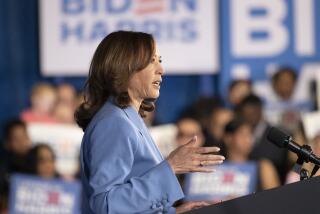Bush Allows Wiggle Room on ‘Revenue Enhancement’
- Share via
WASHINGTON — Only a day after ending a presidential campaign in which he repeatedly vowed to oppose all tax hikes, President-elect George Bush on Wednesday opened the door a crack to some hidden tax increases in future negotiations with Congress on ways to reduce the federal budget deficit.
When asked at his news conference in Houston whether he would resist all kinds of “revenue enhancements”--a code word on Capitol Hill for various types of subtle rather than explicit tax increases--Bush replied ambiguously that “you’d have to define for me what you mean by revenue enhancement.”
Bush’s statement appeared to provide him with some “wiggle room” to propose tax increases that affect only certain limited groups rather than all taxpayers. It also seemed consistent with the pragmatic, let’s-make-a-deal approach practiced by the man who is Bush’s closest adviser and his first appointee to the Cabinet--Secretary of State-designee James A. Baker III.
At the same time he suggested some kinds of tax hikes might be acceptable, Bush repeated his promise “about holding the line on taxes, and I don’t plan to deviate. I think the American people must have understood that when they voted in rather large numbers for my candidacy.”
But Bush went out of his way to endorse the income tax boost on relatively affluent retirees that was used to pay for this year’s expansive law to protect Medicare beneficiaries from catastrophic medical bills.
Under that law, Medicare recipients with incomes of more than $10,000 will pay a 15% surtax on their federal income tax payments, up to a maximum of $800 per person. The new program, which will affect the most affluent 40% of Medicare beneficiaries, goes into effect Jan. 1.
“Some charge that that was a tax increase,” Bush said. “I don’t think it was.”
“What Bush said looks like a very skillful way to start opening the door to various revenue increases,” said C. Fred Bergsten, a leading Washington economist who heads the Institute for International Economics. “By volunteering when he didn’t have to that the Medicare approach is OK, he appears to be signaling that certain tax increases might be acceptable.”
During his campaign, Bush frequently told cheering crowds that he would resist any proposals from Congress to increase taxes as part of a broad deficit-cutting package because Democrats would just use the money to boost spending. “Read my lips,” Bush promised to tell lawmakers. “No new taxes.”
Provides Maneuvering Room
Former House Budget Committee Chairman James R. Jones (D-Okla.), now a Washington lawyer, said Wednesday that he believed Bush’s campaign vow provided him with maneuvering room to accept some kinds of tax increases later next year. In particular, he held out the possibility that tax deductions and exemptions might be eliminated to broaden the base of income subject to taxation.
“You won’t see any explicit increases in the income tax, but that doesn’t mean that you can’t justify some kinds of base broadening or some excise tax hikes,” Jones said. “I think (Bush) will have some time, however, before he has to act. Changing economic conditions and the Gramm-Rudman deadline could be the forcing action allowing Bush to come forward with revenue increases.”
The Gramm-Rudman budget law requires Congress and the White House to reach agreement by next Oct. 1 on a plan to get next year’s budget deficit under $110 billion. Otherwise, across-the-board spending cuts would automatically be triggered.
Bush has proposed that the budget can be balanced by the end of his first term in office through a “flexible freeze” that would limit the overall increase in government spending to the inflation rate.
Refuses to Give Specifics
But he has refused to specify what programs he thinks should be cut to prevent spending from growing at a faster rate. Without cuts, the nonpartisan Congressional Budget Office estimates, government spending will rise more than 5% a year--faster than the likely inflation rate--even without any new programs that Bush might want.
On Capitol Hill, leading lawmakers made it clear they do not believe that an acceptable deficit reduction can be developed without some tax increases.
“I don’t read lips,” Rep. Dan Rostenkowski (D-Ill.), the earthy, blunt-spoken chairman of the House Ways and Means Committee, said in a television interview on election night. “If George Bush wants to do something about the deficit . . . you’ve got to talk about revenues.”
And Senate Republican leader Bob Dole of Kansas told reporters: “We’ve got to deal with the deficit. Nobody’s talked much about that--we have to deal with that first.” Dole added that it would be almost impossible to close the budget gap over the next few years without additional revenues from, for example, higher taxes on cigarettes and liquor or user fees.
More to Read
Get the L.A. Times Politics newsletter
Deeply reported insights into legislation, politics and policy from Sacramento, Washington and beyond. In your inbox twice per week.
You may occasionally receive promotional content from the Los Angeles Times.










